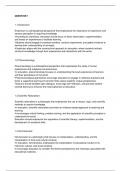QUESTION 1
1.1 Empiricism:
Empiricism is a philosophical perspective that emphasises the importance of experience and
sensory perception in acquiring knowledge.
•According to empiricists, education should focus on direct observation, experimentation,
and hands-on experiences to facilitate learning.
•Students should engage in practical activities, conduct experiments, and gather evidence to
develop their understanding of concepts.
•Empiricism aligns with the constructivist approach to education, where students actively
construct knowledge through their experiences and interactions with the world.
1.2 Phenomenology:
Phenomenology is a philosophical perspective that emphasises the study of human
experiences and subjective consciousness.
•In education, phenomenology focuses on understanding the lived experiences of learners
and their perceptions of the world.
•Phenomenological approaches encourage educators to engage in reflective practices and
foster a supportive learning environment that values students' unique perspectives.
Teachers should facilitate open dialogue, encourage self-reflection, and promote student-
centred learning to enhance the meaningfulness of education.
1.3 Scientific Rationalism:
Scientific rationalism is a philosophy that emphasizes the use of reason, logic, and scientific
methods to acquire knowledge.
•In education, scientific rationalism promotes an evidence-based approach to teaching and
learning.
•It encourages critical thinking, problem-solving, and the application of scientific principles to
understand the world.
Education should emphasize the acquisition of scientific literacy, experimentation, and the
development of analytical skills.
1.4 Hermeneutics:
Hermeneutics is a philosophy that focuses on interpretation, understanding, and the
interpretation of texts and cultural contexts.
•In education, hermeneutics emphasizes the interpretation of educational content in its
historical, cultural, and social contexts.
It encourages educators to consider the diverse perspectives and meanings associated with
educational materials.
, •Hermeneutic approaches promote critical thinking, cultural sensitivity, and the exploration of
multiple interpretations.
1.5 Critical Theory:
Critical Theory is a philosophical perspective that explores power structures, social
inequality, and the relationship between knowledge and social change.
•In education, critical theory encourages the examination of social and political issues to
foster critical consciousness and transformative action.
•Education should empower students to critically analyze societal norms, challenge
injustices, and work towards a more equitable and just society.
QUESTION 2
2.1 Ubuntu is a philosophical concept deeply rooted in African culture, emphasizing
communal harmony, empathy, and interconnectedness.
In classroom practice, incorporating ubuntu involves promoting a sense of community,
collaboration, and respect among students.
Teachers can encourage cooperative learning, promote inclusive discussions, and foster a
supportive classroom environment.
Ubuntu can also be integrated by acknowledging and valuing students' diverse backgrounds,
experiences, and contributions.
By embracing ubuntu, classrooms can become inclusive spaces that nurture empathy,
understanding, and collective responsibility.
2.2Cultural Relevance: African philosophy recognizes and values the diverse cultural
heritage and knowledge systems of Africa. It can help us develop an educational approach
that is culturally relevant, affirming the identities and experiences of African learners. By
incorporating African philosophy into education, we can promote a sense of pride, belonging,
and cultural continuity among students.
Decolonization: African philosophy challenges the legacy of colonialism and Eurocentric
dominance in education. It encourages us to critically examine the curriculum, pedagogy,
and power dynamics within educational institutions. By incorporating African philosophical
perspectives, we can work towards decolonizing education, fostering a more inclusive and
equitable learning environment.
Ubuntu and Communalism: Ubuntu, an important concept in African philosophy, emphasizes
the interconnectedness and interdependence of individuals within a community. It promotes
values such as empathy, cooperation, and communal responsibility. By incorporating Ubuntu
into education, we can foster a sense of community, social cohesion, and collective well-
being among students. It can also encourage a supportive and inclusive classroom
environment.




